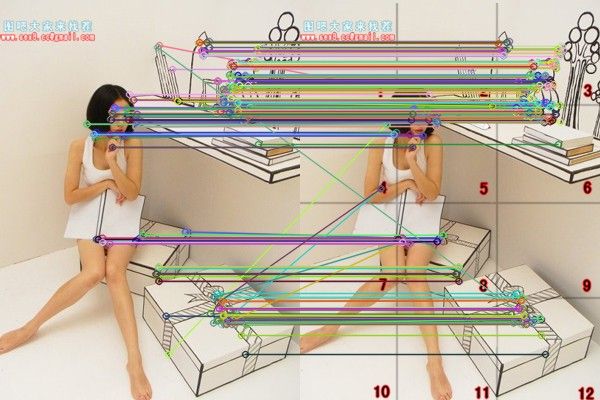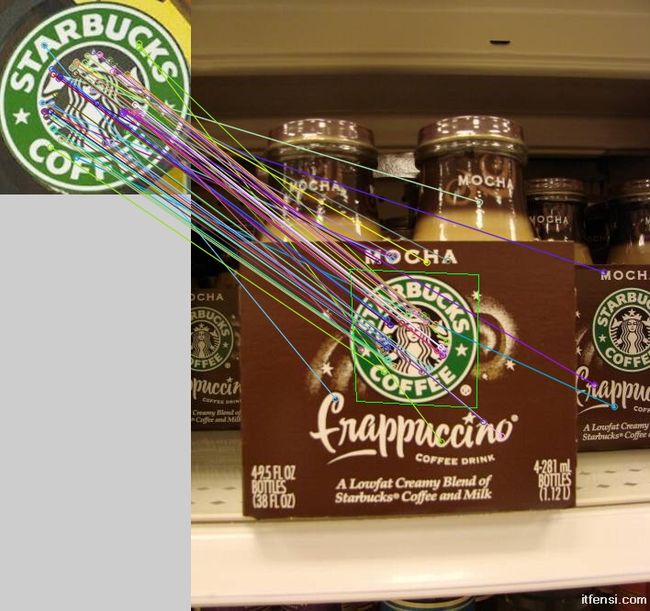OpenCV的ORB特征提取算法
看到OpenCV2.3.1里面ORB特征提取算法也在里面了,套用给的SURF特征例子程序改为ORB特征一直提示错误,类型不匹配神马的,由于没有找到示例程序,只能自己找答案。
(ORB特征论文:ORB: an efficient alternative to SIFT or SURF.点击下载论文)
经过查找发现:
描述符数据类型有是float的,比如说SIFT,SURF描述符,还有是uchar的,比如说有ORB,BRIEF
对于float 匹配方式有:
FlannBased
BruteForce<L2<float> >
BruteForce<SL2<float> >
BruteForce<L1<float> >
对于uchar有:
BruteForce<Hammin>
BruteForce<HammingLUT>
BruteForceMatcher< L2<float> > matcher;//改动的地方
BruteForceMatcher< L2<float> > matcher;//改动的地方
完整代码如下:
#include <iostream>
#include "opencv2/core/core.hpp"
#include "opencv2/features2d/features2d.hpp"
#include "opencv2/highgui/highgui.hpp"
#include <iostream>
#include <vector>
using namespace cv;
using namespace std;
int main()
{
Mat img_1 = imread("D:\\image\\img1.jpg");
Mat img_2 = imread("D:\\image\\img2.jpg");
if (!img_1.data || !img_2.data)
{
cout << "error reading images " << endl;
return -1;
}
ORB orb;
vector<KeyPoint> keyPoints_1, keyPoints_2;
Mat descriptors_1, descriptors_2;
orb(img_1, Mat(), keyPoints_1, descriptors_1);
orb(img_2, Mat(), keyPoints_2, descriptors_2);
BruteForceMatcher<HammingLUT> matcher;
vector<DMatch> matches;
matcher.match(descriptors_1, descriptors_2, matches);
double max_dist = 0; double min_dist = 100;
//-- Quick calculation of max and min distances between keypoints
for( int i = 0; i < descriptors_1.rows; i++ )
{
double dist = matches[i].distance;
if( dist < min_dist ) min_dist = dist;
if( dist > max_dist ) max_dist = dist;
}
printf("-- Max dist : %f \n", max_dist );
printf("-- Min dist : %f \n", min_dist );
//-- Draw only "good" matches (i.e. whose distance is less than 0.6*max_dist )
//-- PS.- radiusMatch can also be used here.
std::vector< DMatch > good_matches;
for( int i = 0; i < descriptors_1.rows; i++ )
{
if( matches[i].distance < 0.6*max_dist )
{
good_matches.push_back( matches[i]);
}
}
Mat img_matches;
drawMatches(img_1, keyPoints_1, img_2, keyPoints_2,
good_matches, img_matches, Scalar::all(-1), Scalar::all(-1),
vector<char>(), DrawMatchesFlags::NOT_DRAW_SINGLE_POINTS);
imshow( "Match", img_matches);
cvWaitKey();
return 0;
}
另外: SURF SIFT
/* SIFT sift; sift(img_1, Mat(), keyPoints_1, descriptors_1); sift(img_2, Mat(), keyPoints_2, descriptors_2); BruteForceMatcher<L2<float> > matcher; */ /* SURF surf; surf(img_1, Mat(), keyPoints_1); surf(img_2, Mat(), keyPoints_2); SurfDescriptorExtractor extrator; extrator.compute(img_1, keyPoints_1, descriptors_1); extrator.compute(img_2, keyPoints_2, descriptors_2); BruteForceMatcher<L2<float> > matcher; */
效果:
另外一个是寻找目标匹配
在右边的场景图里面寻找左边那幅图的starbucks标志
效果如下:
需要在之前的那个imshow之前加上如下代码即可完成一个简单的功能展示:
// localize the object
std::vector<Point2f> obj;
std::vector<Point2f> scene;
for (size_t i = 0; i < good_matches.size(); ++i)
{
// get the keypoints from the good matches
obj.push_back(keyPoints_1[ good_matches[i].queryIdx ].pt);
scene.push_back(keyPoints_2[ good_matches[i].trainIdx ].pt);
}
Mat H = findHomography( obj, scene, CV_RANSAC );
// get the corners from the image_1
std::vector<Point2f> obj_corners(4);
obj_corners[0] = cvPoint(0,0);
obj_corners[1] = cvPoint( img_1.cols, 0);
obj_corners[2] = cvPoint( img_1.cols, img_1.rows);
obj_corners[3] = cvPoint( 0, img_1.rows);
std::vector<Point2f> scene_corners(4);
perspectiveTransform( obj_corners, scene_corners, H);
// draw lines between the corners (the mapped object in the scene - image_2)
line( img_matches, scene_corners[0] + Point2f( img_1.cols, 0), scene_corners[1] + Point2f( img_1.cols, 0),Scalar(0,255,0));
line( img_matches, scene_corners[1] + Point2f( img_1.cols, 0), scene_corners[2] + Point2f( img_1.cols, 0),Scalar(0,255,0));
line( img_matches, scene_corners[2] + Point2f( img_1.cols, 0), scene_corners[3] + Point2f( img_1.cols, 0),Scalar(0,255,0));
line( img_matches, scene_corners[3] + Point2f( img_1.cols, 0), scene_corners[0] + Point2f( img_1.cols, 0),Scalar(0,255,0));

